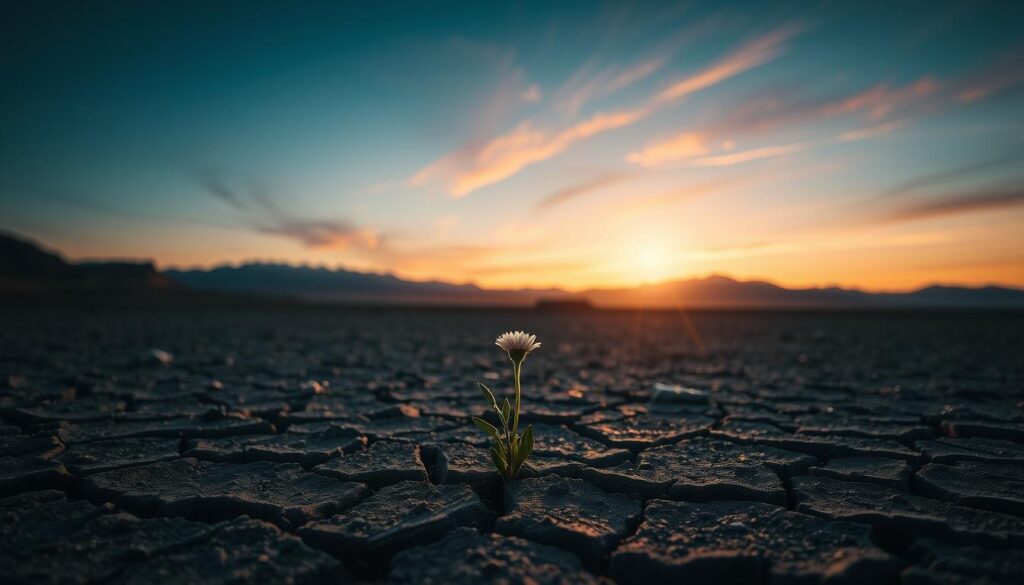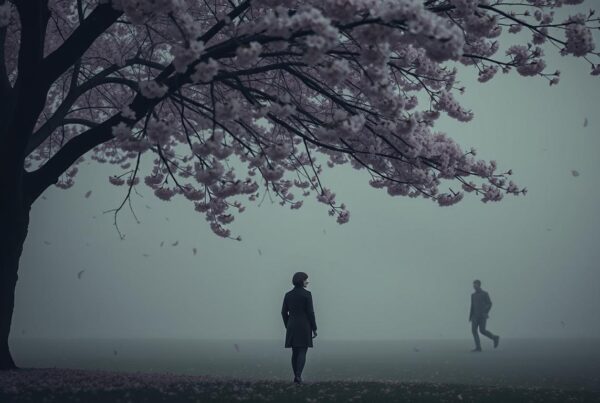Unrequited love touches many hearts, leaving deep emotional growth and healing. It’s often seen as painful. Yet, it plays a big role in our growth, shaping us emotionally, psychologically, and socially.
We’ll look into the effects of unrequited love, its nature, and its impact on life. By understanding these experiences, we can see the lessons and changes they bring.
The Nature of Unrequited Love
Unrequited love, or one-sided love, is something many people experience. It happens when someone feels romantic feelings that aren’t shared back. Understanding this is key to knowing about human relationships and how rejection affects us.
Understanding Unrequited Love
One-sided love is all about wanting someone who doesn’t feel the same way. It can be because of different feelings, interests, or being with someone else. Knowing these reasons helps us understand our feelings better.
Common Scenarios of Unrequited Love
Unreciprocated feelings can show up in many ways. For example, someone might fall for a coworker who sees them as just a friend. Or, they might deeply love someone who is not available. Dealing with these feelings can be tough but is important for growing as a person.
Emotional Impact of Unrequited Love
Feeling unrequited love can be very intense and personal. It can hurt your self-esteem and make you question your worth. This makes it hard to get over heartbreak.
Feelings of Rejection
Feeling rejected is a big part of unrequited love. It makes you very sensitive to rejection. This can make you doubt your value and feel unwanted.
Dealing with Loneliness
Unrequited love also brings deep loneliness. To heal, you need to find ways to feel connected. Doing things that make you feel part of a group helps.
Psychological Effects
Unrequited love can deeply affect a person’s mind, leading to big mental health issues. This kind of love without return can cause anxiety and depression. It can also make someone feel very bad about themselves, leading to depression.
Experts say unrequited love can make a person feel low about themselves and more open to stress. The wish for love back can keep someone in a state of emotional upset. This shows why it’s key to see and deal with the mental health problems caused by unrequited love.
Psychologists also talk about how unrequited love depression shows up in different ways. Some feel like they’ve been rejected, while others feel very alone. The constant wish for someone’s love without getting it back can make people feel sad and anxious all the time.
The mental stress from unrequited love isn’t just about feeling bad. It can also mess up daily life. People might struggle to work, keep up with friends, or even take care of themselves. Knowing how unrequited love affects the mind helps people get the help they need.
The Role of Hope and Illusion
Unrequited love often leaves people with false hope and illusions. These feelings deeply affect our mental health. They mix hope with the harsh truth of unreturned love. But why do we keep hoping, even when it hurts?

Hope is a key part of being human. It pushes us to believe in good things happening. In love, it means we hold onto the hope that our feelings will be returned. These illusions give us temporary comfort, even when they might not last.
Why We Cling to Hope
Staying hopeful in unrequited love is about emotional strength. This strength helps us deal with the pain of being rejected. Our minds use false hope to protect us from the pain of loss. But, this can also slow down our healing and growth.
It’s important to find a balance between hope and acceptance. Understanding why we hold onto hope helps us grow emotionally. It can lead to better relationships in the future.
Lessons Learned from Unrequited Love
Unrequited love can be tough, but it teaches us a lot. We learn about ourselves and grow. This helps us understand our feelings better.
Self-Discovery
Unrequited love makes us look inside ourselves. We find out what we really want and what we’re good at. It’s a hard journey, but it makes us wiser about our feelings.
Growth and Maturity
Going through unrequited love makes us grow up faster. It teaches us to handle tough emotions. We become stronger and wiser, turning pain into power.
Moving On: Healing from Unrequited Love
Healing from unrequited love is tough, but it’s doable. Start by facing your feelings and grieving for what could have been. Therapists say to care for yourself and find joy in new things.
Surround yourself with loved ones for support. Their comfort can help you heal. Try new hobbies to take your mind off the pain.
Remember, healing at your own pace is okay. Mindfulness and meditation can help you stay positive. Letting go of love will make you stronger and help you grow.
Echoes of the Heart: How Unrequited Love Shapes Us
Unrequited love deeply affects us, leaving lasting marks on our hearts. It may hurt, but it teaches us a lot about ourselves. This part looks at personal stories and testimonials, showing how unrequited love leads to growth and change.
Personal Stories and Testimonials
Many people have shared their stories of unrequited love. These stories are both unique and common. They show how the pain of unrequited love can lead to growth and self-understanding.
These stories cover everything from first love to long-lasting longing. They show the power of love that isn’t returned.
Reflections on Past Experiences
Looking back at unrequited love experiences can make us more aware and mature. It helps us understand our reactions to heartache and learn important lessons. Through reflection, many find peace and appreciate the growth from their experiences.
The Importance of Self-Love
Cultivating self-love is key for your well-being and emotional health. It helps you feel worthy and accepted, leading to happier relationships and goals. By taking care of yourself, you grow to appreciate yourself more and make positive changes in your life.

Building Self-Esteem
Building self-esteem means seeing and loving your true value. Experts like Brené Brown say self-acceptance and kindness are crucial. Celebrate your wins, no matter how small, and know your worth comes from within, not from others.
Practicing Self-Care
Self-care is vital for taking care of yourself. It includes activities like yoga, eating well, and meditation. These habits boost your self-love and help you live a balanced, happy life.
Coping Mechanisms
Dealing with unrequited love can be tough. Finding ways to cope is crucial. Activities like journaling or talking to a friend can help release your feelings.
Mindfulness and meditation are great for your emotional health. They help you understand your feelings better. Exercise is also helpful. It makes you feel better by releasing happy chemicals in your body.
Seeing a therapist is also a good idea. They can give you advice that fits your situation. Studies show talking to a professional can really help you heal.
Unrequited Love in Literature and Media
Unrequited love is a timeless theme in literature and media. It shows one of the most poignant human experiences. From classic love stories to today’s content, it deeply influences romantic narratives. It continues to resonate with audiences worldwide.
Classic Love Stories
Classic literature is full of love themes, often showing the pain and beauty of unrequited love. William Shakespeare’s “Romeo and Juliet” captures the tragic essence of unattainable love. Charlotte Brontë’s “Jane Eyre” poignantly portrays the yearning and heartache of such emotions.
These stories have stood the test of time. They allow readers to explore the complexities of unfulfilled love.
Modern Interpretations
In today’s media, unrequited love is portrayed in new ways yet remains relevant. TV shows like “Friends” show this with characters like Ross and Rachel. They show how unrequited love can be part of different stories.
Films like “500 Days of Summer” analyze it through a modern lens. They engage audiences with a fresh look at personal relationships. These stories continue to draw audiences, resonating deeply with personal experiences and societal expectations.
Unrequited Love Across Different Cultures
Unrequited love is a feeling we all know, but it means different things in different places. By looking at how love is seen in various cultures, we learn a lot. We see how unrequited love affects our love lives across cultures.
Western vs. Eastern Perspectives
In Western cultures, unrequited love is a big part of love stories. It’s about feeling deeply and growing as a person. Movies and books from the West show the pain of loving someone who doesn’t love you back. They show how important it is to express our feelings and think deeply.
But in Eastern cultures, love is seen differently. It’s about keeping the family happy and following tradition. If love doesn’t fit with family plans, it’s seen as less important. This shows how culture changes how we feel and see love.
Cultural Rituals and Norms
Cultural traditions also play a big role in how we experience love. In Japan, for example, there’s a special Valentine’s Day tradition called “Giri choco”. It’s about giving chocolates out of duty, not love. This shows the difference between doing something out of love and doing it because you have to.
In some Latin American countries, singing to someone you love is a big deal. It’s a way to show love in public. Whether the other person likes it or not, it’s a big moment. These customs show how love is shown differently in different places.
Looking at how love is seen in different cultures helps us understand it better. Whether it’s shown loudly or quietly, the feeling of loving someone who doesn’t love you back is universal. It shows our common desire for connection and understanding.
Transformative Power of Unrequited Love
Unrequited love is very painful but also very powerful. It can turn pain into strength. This change helps us understand ourselves better and become stronger.
When we experience unreciprocated love, we start to improve ourselves. It’s not just about getting over the hurt. It’s about finding our inner strength and pursuing our dreams.
Psychologists like Brené Brown talk about the power of being vulnerable. Facing unrequited love makes us rethink our values and goals. It helps us find who we truly are, showing how pain can become strength.



